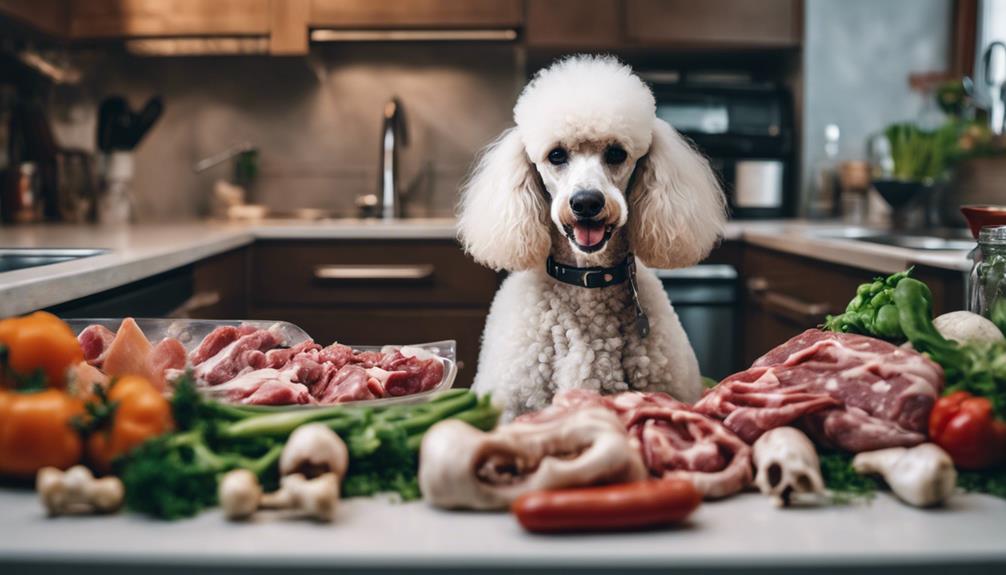When considering a raw diet for your Poodle, think of it as laying the cornerstone for their overall well-being and vitality. Transitioning to a raw diet can be a transformative journey for your furry companion, with benefits that go beyond just nutrition. As you navigate through the guidelines and safety tips, you'll uncover essential insights on how to optimize your Poodle's health through a carefully curated diet. So, are you ready to embark on this path towards a healthier lifestyle for your beloved Poodle?
Key Takeaways
- Ensure healthier skin, digestion, and immunity with a raw diet for Poodles.
- Follow strict safety measures for handling and storing raw food.
- Consult a vet for balanced nutrition and monitor Poodle's health.
- Gradually transition Poodles to raw food, considering their preferences and nutritional needs.
Benefits of Raw Diet for Poodles
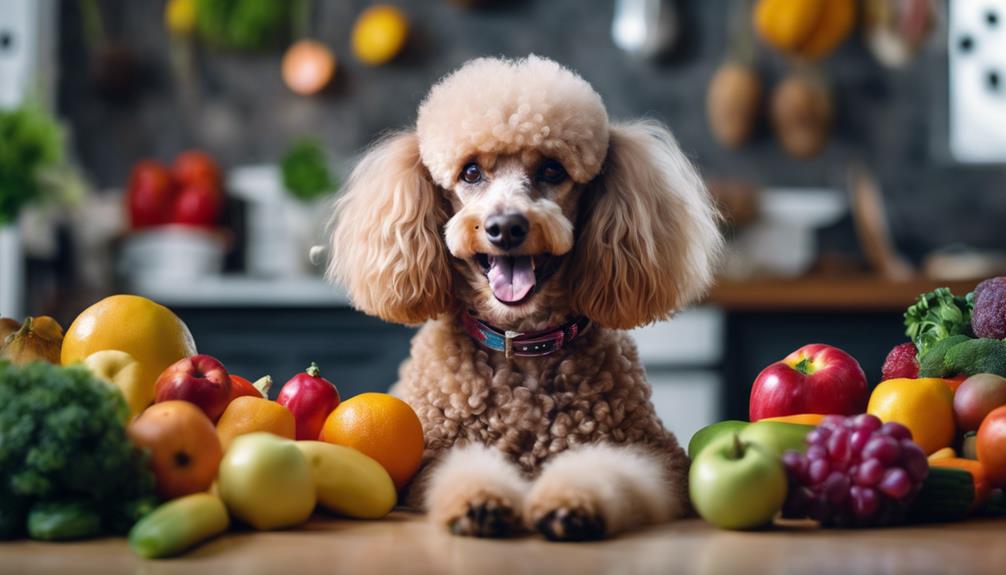
Feeding your Poodle a raw diet can offer numerous benefits that contribute to their overall health and well-being. Poodles on a raw diet may experience healthier skin and coat due to the natural, nutrient-rich foods they consume. The raw diet promotes improved digestion and better nutrient absorption, leading to enhanced overall health. By providing a species-appropriate diet, raw feeding can help Poodles maintain a healthy weight and increase energy levels, supporting their active lifestyle.
Furthermore, Poodles on a raw diet may benefit from reduced allergies and sensitivities since they are consuming natural, species-appropriate food. The immune system of Poodles can also be strengthened through a raw diet, leading to better overall health and well-being. By incorporating a raw diet into your Poodle's feeding routine, you are not only providing them with a diet closer to what nature intended but also potentially improving their quality of life.
Safety Tips for Raw Feeding
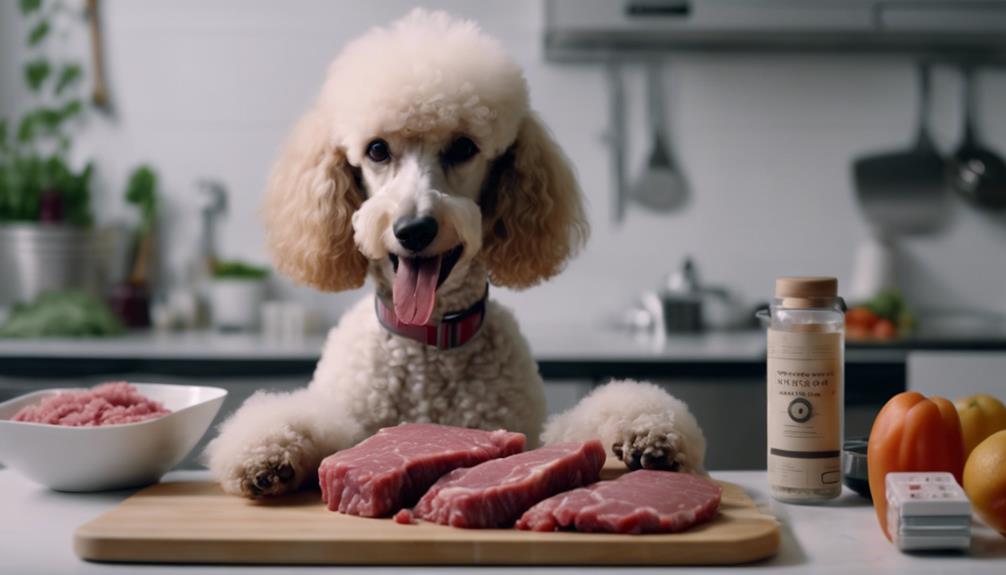
When feeding your Poodle a raw diet, remember to handle the food safely by washing hands and surfaces thoroughly. Ensure you store the raw food properly in the freezer and use separate utensils to prevent cross-contamination. It's crucial to monitor your Poodle during the transition to a raw diet and consult with your vet for guidance on meeting their balanced nutritional needs.
Proper Food Handling
Properly handling raw dog food is crucial to prevent bacterial contamination and maintain hygiene. Remember to wash your hands thoroughly after handling raw meat to avoid spreading bacteria. It's essential to use designated utensils and containers for raw feeding to prevent cross-contamination with other foods. Before and after feeding your poodle, ensure that all surfaces and utensils are cleaned to avoid any potential health risks. Properly storing raw dog food is key to preventing bacterial growth and keeping the food fresh for your pet. Additionally, washing produce before serving it can help reduce the risk of bacterial contamination in your poodle's raw diet. By following these steps, you can ensure the safety and well-being of your furry friend.
Balanced Nutritional Needs
A balanced raw diet for poodles necessitates careful consideration of their nutritional needs, encompassing proper ratios of meat, bones, and organs to ensure optimal health and well-being. Poodles thrive on a variety of proteins like chicken, beef, and turkey to meet their feeding requirements adequately. It's vital to monitor bone intake to prevent dental issues and maintain a balanced raw diet for your poodle. Supplementing their diet with fruits and vegetables can offer essential vitamins and minerals crucial for their overall health. By providing a diverse range of foods, you can help ensure your poodle receives a well-rounded diet that supports their nutritional needs. Remember, balanced nutrition is key to keeping your poodle healthy and happy on a raw feeding regimen.
Consult With Vet
Before starting your Poodle on a raw diet, ensure to consult with a veterinarian to address their individual nutritional requirements. Vets can offer guidance on the proper balance of meat, organs, and bones necessary for your Poodle's raw diet. Consulting with a vet is crucial to address any health concerns or risks associated with raw feeding for Poodles. Additionally, vets can recommend supplements or adjustments to the raw diet to ensure your Poodle remains healthy and thriving. Regular check-ups with a vet are essential to monitor your Poodle's health and address any issues related to their raw diet. By consulting with a vet, you can ensure that your Poodle's nutritional needs are met and that they maintain optimal health on a raw diet.
Proper Handling of Raw Food
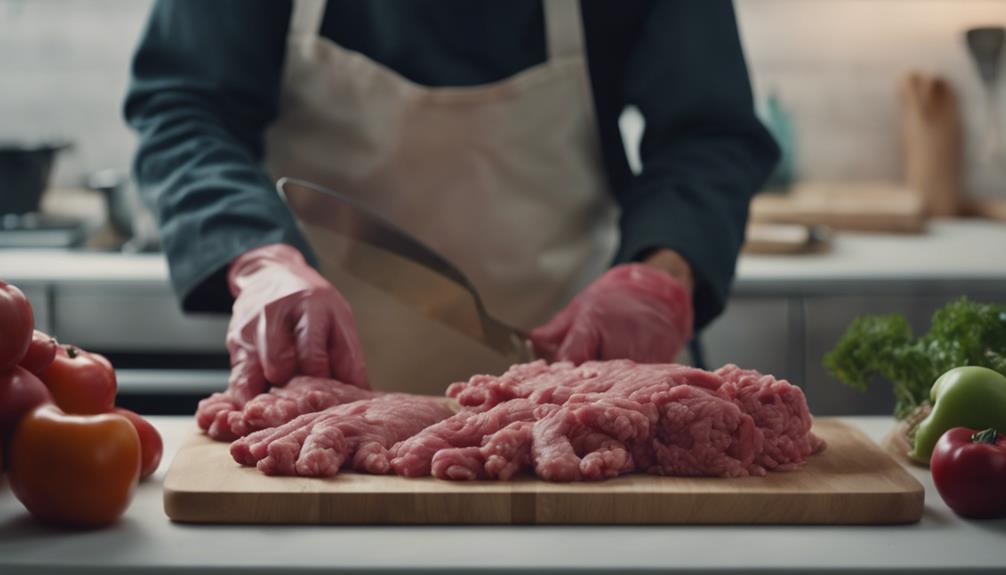
When handling raw dog food, always wash your hands thoroughly to prevent the spread of bacteria. This practice is essential for maintaining hygiene and preventing contamination. It is also crucial to use designated utensils and containers exclusively for raw dog food to avoid cross-contamination with other foods. Clean surfaces and utensils before and after preparing raw dog food to further minimize the risk of bacterial growth. Proper storage of raw dog food is key to ensuring its freshness and preventing the proliferation of harmful bacteria. Additionally, washing fruits and vegetables before including them in your poodle's raw diet can help reduce the risk of contamination. By following these safe handling practices, you can help keep your poodle healthy and safe while enjoying the benefits of a raw food diet.
Transitioning Poodles to Raw Diet
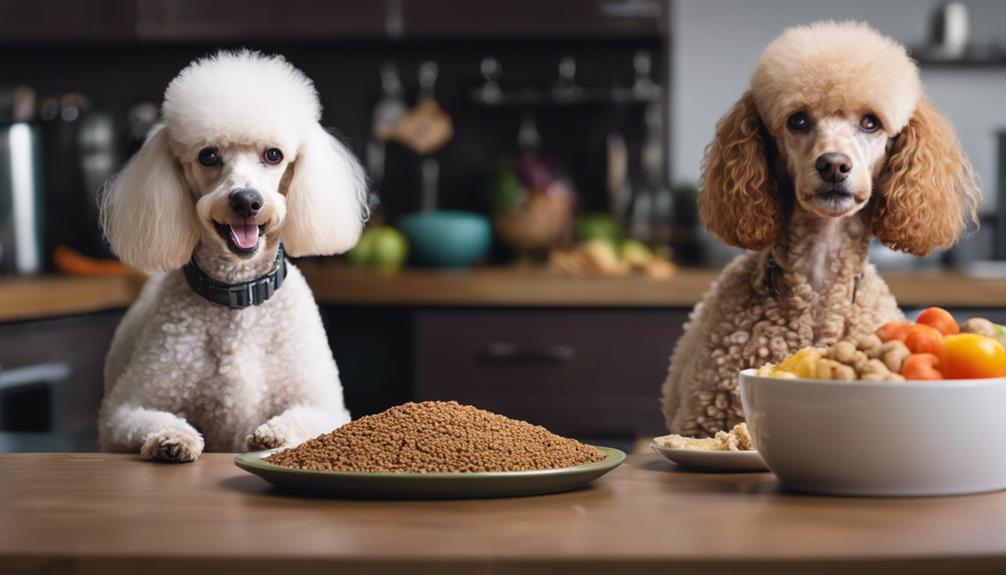
To smoothly transition your Poodle to a raw diet, gradually introduce small amounts of raw food mixed with their current diet over a period of 7-10 days. This gradual approach helps prevent digestive upsets and allows your Poodle's system to adjust to the new diet effectively. Begin by mixing a small portion of raw food with their regular food, then slowly increase the ratio of raw food while decreasing their previous diet. During this transition period, monitor your Poodle's stool consistency, energy levels, and overall health closely. Any signs of digestive issues or discomfort should prompt a reassessment of the transition process. Consulting with a veterinarian before and during the transition is essential to address any specific dietary concerns or adjustments for your Poodle. Additionally, consider incorporating a variety of proteins like chicken, beef, and lamb to ensure a balanced and nutritious raw diet for your furry companion. By following these steps, you can help your Poodle transition smoothly and enjoy the benefits of a raw diet.
Monitoring Poodle's Health on Raw Diet
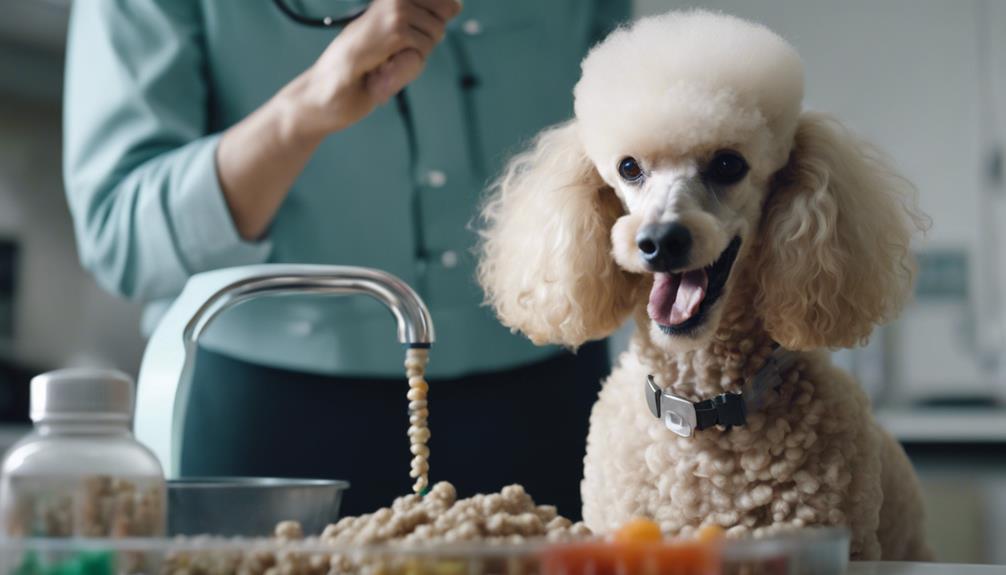
For optimal health monitoring of your Poodle on a raw diet, regularly check their weight to ensure they maintain a healthy body condition. Sudden weight loss or gain could indicate an issue with their diet. Additionally, observe any changes in your Poodle's energy levels or behavior, as these can be early signs of health problems. Monitoring their stool consistency is also crucial; it reflects how well they are digesting and utilizing the raw diet. Remember to schedule regular check-ups with your vet to assess your Poodle's overall health and discuss any concerns related to their raw diet. Keep an eye out for signs of nutrient deficiencies such as a dull coat, lethargy, or poor appetite, which may signal the need for dietary adjustments. By staying vigilant and proactive in monitoring your Poodle's health while on a raw diet, you can ensure they thrive on this nutrition plan.
Balancing Nutrients in Raw Diet
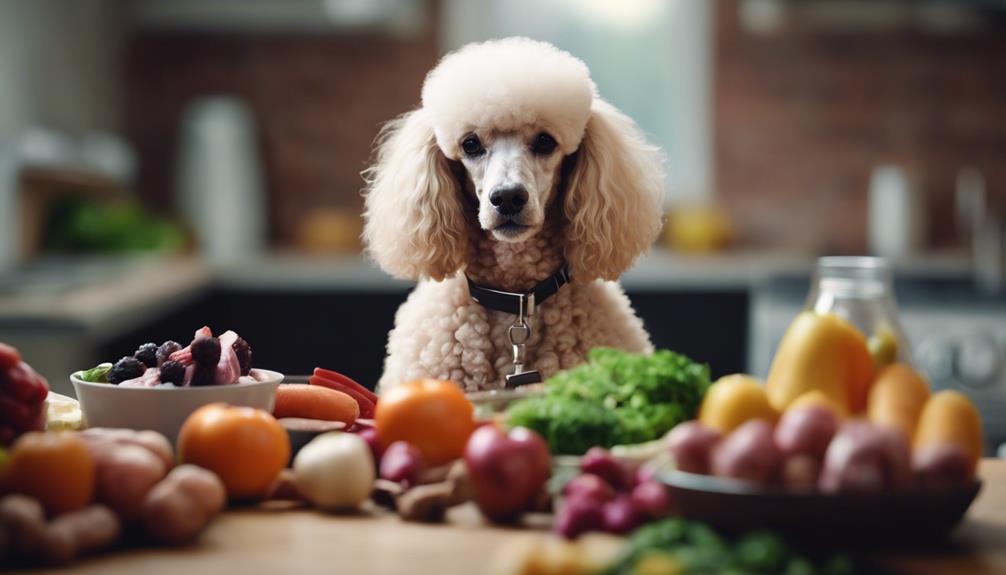
To ensure your Poodle's raw diet is balanced, focus on incorporating essential nutrient sources like meat, bones, and organs in appropriate proportions. Monitor your Poodle's nutrient intake closely to prevent deficiencies or excesses that could impact their health. Including a variety of protein sources and organ meats can help achieve a well-rounded diet for your Poodle's optimal well-being.
Essential Nutrient Sources
Balancing essential nutrients in a raw diet for Poodles requires a thoughtful selection of protein sources such as chicken, beef, and fish to ensure overall health and well-being. These protein sources provide vital amino acids necessary for muscle development and other physiological functions. In addition to proteins, fats are essential for energy and nutrient absorption, so incorporating healthy fats like those from fish oil is crucial. Vitamins and minerals, found abundantly in organ meats like liver and kidney, play a critical role in supporting immunity and overall well-being. Omega-3 fatty acids, commonly sourced from fish oil, are beneficial for maintaining healthy skin and coat in Poodles. By carefully considering these nutrient sources, you can meet your Poodle's nutritional needs for a thriving, balanced diet.
Monitoring Nutrient Intake
Optimizing your Poodle's health through a raw diet involves meticulously monitoring the intake of essential nutrients such as protein, vitamins, minerals, and fatty acids. To ensure your Poodle receives a balanced diet, consider the following:
- Balancing nutrients in a raw diet for Poodles involves ensuring the right ratios of meat, bones, and organs are provided.
- Poodles need a diet rich in protein, vitamins, minerals, and essential fatty acids for optimal health.
- Including a variety of protein sources like beef, chicken, and fish helps meet Poodles' nutrient requirements.
- Properly balancing nutrients in a raw diet supports Poodles' muscle development, energy levels, and overall well-being.
Common Mistakes to Avoid With Raw Feeding
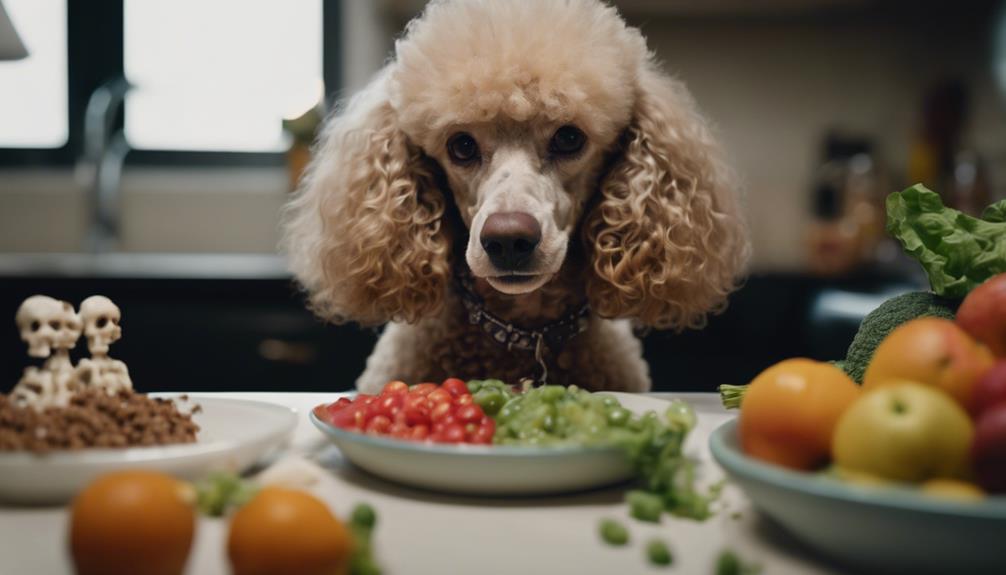
When feeding your poodle a raw diet, it is crucial to be mindful of common mistakes that can impact their nutritional health. One of the key errors to avoid is overlooking the importance of the bone-to-meat ratio in their diet. This ratio is essential for maintaining proper nutrition and preventing imbalances. Additionally, failing to provide a variety of protein sources can lead to deficiencies in crucial nutrients necessary for your poodle's well-being.
To help you navigate the potential pitfalls of raw feeding, here are some common mistakes to avoid:
| Mistakes to Avoid | Impact on Poodle's Health |
|---|---|
| Neglecting bone-to-meat ratio | Nutritional imbalances |
| Lack of protein source variety | Essential nutrient deficiencies |
| Poor handling leading to contamination | Bacterial infections and foodborne illnesses |
| Skipping veterinary consultation | Health compromise without tailored balanced diet |
Frequently Asked Questions
How Do I Make Sure Raw Food Is Safe for My Dog?
To ensure raw food is safe for your dog, source high-quality ingredients, practice safe handling to prevent contamination, maintain nutritional balance, gradually transition to the new diet, consult with a vet, monitor health, and be aware of potential risks.
Can Poodles Be on Raw Diet?
For Poodle health, consider a raw diet. Ensure nutritional balance, support their digestive system. Prepare meals with varied protein sources. Seek veterinarian approval and follow a gradual transition. Enhance their well-being and energy levels.
What Are the Guidelines for Raw Food Dogs?
Protein sources in raw food diets include meats like beef, chicken, and fish. Nutritional balance is crucial for your dog's health. During the transition period, gradually introduce new foods. Offer a variety of meats for diverse nutrients. Remember to monitor their health and consider necessary supplements. Meal prep is key.
What Is the Raw Food Protocol?
Raw food protocol for Poodles involves feeding uncooked meat, bones, organs, and connective tissue. Ensure nutritional balance by following the 80/10/10 rule. Transition gradually, vary meals, monitor digestion, and source quality ingredients for optimal health benefits.
Conclusion
In conclusion, transitioning your Poodle to a raw diet can have numerous benefits for their health and well-being. Did you know that a study published in the Journal of Animal Science found that dogs on a raw diet had significantly lower levels of inflammation compared to those on a commercial diet? By following the guidelines and safety tips outlined in this article, you can ensure a successful and healthy transition to raw feeding for your beloved Poodle.
